The Captagon Battle: From Empowerment to Disassembly
August 22, 20251593 ViewsRead Time: 2 minutes

Font Size:
16
In a historic transformation witnessed in the Syrian scene, the new Syrian government is leading an unprecedented campaign to eradicate the drug economy left by the Assad regime, which turned Syria into one of the largest producers of Captagon in the world. This battle is not just a security campaign; it is part of a deeper project to restore state sovereignty and combat organized corruption.
According to a report by the "Financial Times", the Assad regime used drugs as a political and financial tool, where:
Recruiting military personnel: Distributing Captagon for free to soldiers or mixing it with their drinks before military operations.
Elite networks: Influential figures in the previous leadership (including senior military leaders) used the state's infrastructure and seaports to export grains to 40 countries.
Parallel economy: Annual revenues estimated at $5 billion, which funded the war and repression.
Led by President Ahmad al-Shara, the campaign has achieved tangible results:
A decrease in production and smuggling by 80% since January 2025.
Seizure of 320 million Captagon pills and 121 tons of raw materials.
Dismantling of 13 warehouses and 1826 kg of hashish.
Successful border operations such as thwarting the smuggling of 60 kg of hashish from Lebanon.
Despite the successes, the campaign faces significant obstacles such as cross-border networks attempting to re-establish themselves in "soft" regional areas.
Some border guards are still receiving bribes to allow smuggling. Some addicts are transitioning to cheaper and more destructive "crystal meth".
The campaign is no longer just local; it has become a model for international cooperation through technical support programs from the United Nations Office on Drugs and Crime. Strengthening cooperation with neighboring countries, especially Jordan, Lebanon, and Gulf states, links the lifting of sanctions to the continuation of the anti-drug campaign.
The biggest challenge lies in addressing addiction, as there are only 4 treatment centers in all of Syria. Providing solutions for cannabis farmers and those working in smuggling networks. Developing drug enforcement agencies and purging them of corruption.
The campaign has sent a clear message that the era of the "drug state" has ended, but the road ahead is still long. Success depends on international support and funding for treatment and reintegration programs. And confronting the societal stigma surrounding addiction.
Syria, which was described as the "largest Captagon factory in the world", is now on the path of transformation from a drug-promoting state to a state leading the war against it.
According to a report by the "Financial Times", the Assad regime used drugs as a political and financial tool, where:
Recruiting military personnel: Distributing Captagon for free to soldiers or mixing it with their drinks before military operations.
Elite networks: Influential figures in the previous leadership (including senior military leaders) used the state's infrastructure and seaports to export grains to 40 countries.
Parallel economy: Annual revenues estimated at $5 billion, which funded the war and repression.
Led by President Ahmad al-Shara, the campaign has achieved tangible results:
A decrease in production and smuggling by 80% since January 2025.
Seizure of 320 million Captagon pills and 121 tons of raw materials.
Dismantling of 13 warehouses and 1826 kg of hashish.
Successful border operations such as thwarting the smuggling of 60 kg of hashish from Lebanon.
Despite the successes, the campaign faces significant obstacles such as cross-border networks attempting to re-establish themselves in "soft" regional areas.
Some border guards are still receiving bribes to allow smuggling. Some addicts are transitioning to cheaper and more destructive "crystal meth".
The campaign is no longer just local; it has become a model for international cooperation through technical support programs from the United Nations Office on Drugs and Crime. Strengthening cooperation with neighboring countries, especially Jordan, Lebanon, and Gulf states, links the lifting of sanctions to the continuation of the anti-drug campaign.
The biggest challenge lies in addressing addiction, as there are only 4 treatment centers in all of Syria. Providing solutions for cannabis farmers and those working in smuggling networks. Developing drug enforcement agencies and purging them of corruption.
The campaign has sent a clear message that the era of the "drug state" has ended, but the road ahead is still long. Success depends on international support and funding for treatment and reintegration programs. And confronting the societal stigma surrounding addiction.
Syria, which was described as the "largest Captagon factory in the world", is now on the path of transformation from a drug-promoting state to a state leading the war against it.